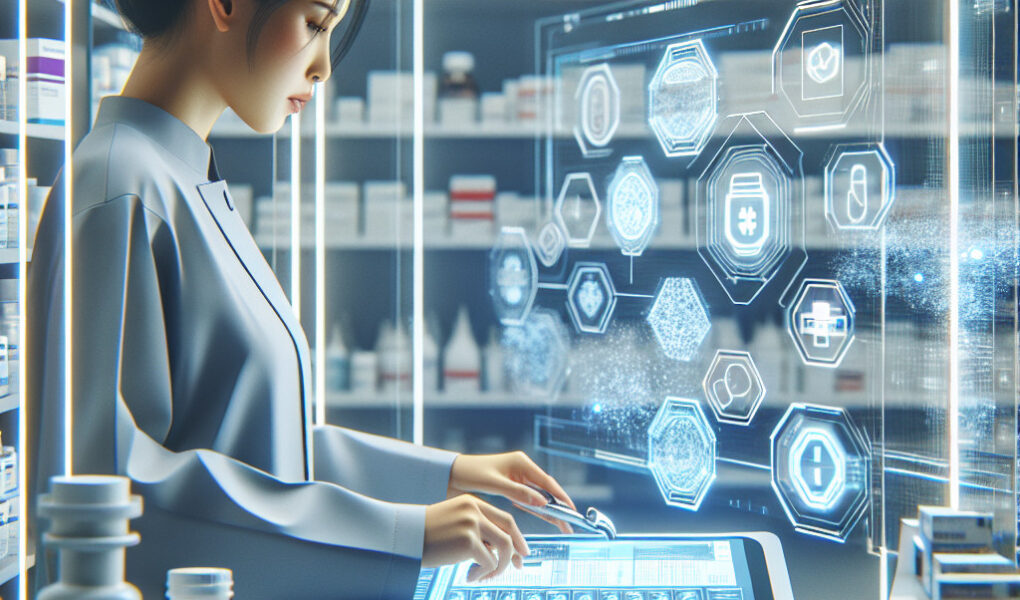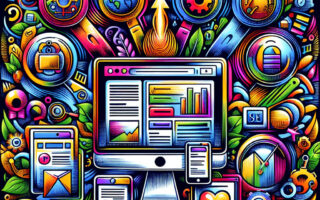- The role of blockchain technology in combating drug counterfeiting
- How artificial intelligence can be used to detect counterfeit medications
- The impact of international cooperation in combating drug counterfeiting
- How technology can empower consumers to verify the authenticity of their medications
- The ethical implications of selling counterfeit drugs
- The role of blockchain technology in combating drug counterfeiting
- The economic costs of drug counterfeiting on the pharmaceutical industry
- The role of artificial intelligence in predicting and preventing drug counterfeiting
The role of blockchain technology in combating drug counterfeiting
Blockchain technology is a decentralized, distributed ledger system that allows for secure and transparent transactions. Each transaction is recorded in a block, which is then linked to the previous block, creating a chain of blocks. This technology has the potential to revolutionize the pharmaceutical industry by providing a secure and immutable record of each drug’s journey from manufacturer to consumer.
By using blockchain technology, pharmaceutical companies can track and verify the authenticity of their products at every step of the supply chain. This ensures that counterfeit drugs are quickly identified and removed from circulation. Additionally, blockchain technology can help to prevent unauthorized tampering with drug packaging or labeling, further reducing the risk of counterfeit products reaching consumers.
One of the key benefits of blockchain technology is its ability to provide transparency and traceability. Each transaction is recorded in a block, which is then linked to the previous block, creating a chain of blocks. This allows for a complete and verifiable record of each drug’s journey from manufacturer to consumer. By providing this level of transparency, blockchain technology can help to build trust among consumers and healthcare providers, ensuring that they are receiving safe and authentic medications.
Furthermore, blockchain technology can also help to streamline the supply chain process, reducing the risk of errors or delays. By automating the tracking and verification of drug shipments, pharmaceutical companies can improve efficiency and reduce costs. This can ultimately lead to lower prices for consumers and increased access to essential medications.
Table: Benefits of blockchain technology in combating drug counterfeiting
| Benefit | Description |
|---|---|
| Transparency | Provides a verifiable record of each drug’s journey from manufacturer to consumer |
| Traceability | Allows for the tracking and verification of drug shipments, reducing the risk of errors or delays |
| Security | Ensures that counterfeit drugs are quickly identified and removed from circulation |
| Efficiency | Streamlines the supply chain process, reducing costs and improving access to medications |
In conclusion, blockchain technology has the potential to revolutionize the pharmaceutical industry by providing a secure and transparent system for combating drug counterfeiting. By leveraging the benefits of blockchain technology, pharmaceutical companies can ensure the safety and authenticity of their products, while also improving efficiency and reducing costs. This technology has the power to transform the way medications are produced, distributed, and consumed, ultimately benefiting patients and healthcare providers around the world.
#blockchain #drugcounterfeiting #pharmaceuticalindustry #transparency #traceability #security #efficiency #supplychain #healthcareproviders
frazy kluczowe:
– blockchain technology in pharmaceutical industry
– combating drug counterfeiting with blockchain
– benefits of blockchain in drug supply chain
– role of blockchain in healthcare sector
– secure drug distribution with blockchain technology
How artificial intelligence can be used to detect counterfeit medications
How does AI work in detecting counterfeit medications?
– AI algorithms can analyze large amounts of data to identify patterns and anomalies that may indicate the presence of counterfeit medications.
– AI can be used to track the supply chain of pharmaceutical products, from manufacturing to distribution, to identify potential points of entry for counterfeit medications.
– AI can analyze images of medications to detect subtle differences in packaging or labeling that may indicate counterfeit products.
– AI can also be used to monitor online marketplaces and social media platforms for the sale of counterfeit medications.
The benefits of using AI in detecting counterfeit medications
– AI can help to identify counterfeit medications more quickly and accurately than traditional methods, allowing for faster response and mitigation of the risks to public health.
– AI can help to reduce the cost and resources required to detect counterfeit medications, making it a more efficient and cost-effective solution for pharmaceutical companies and regulatory agencies.
– AI can help to improve the overall safety and quality of pharmaceutical products, ensuring that patients receive the medications they need to treat their conditions effectively.
In conclusion, artificial intelligence has the potential to revolutionize the detection of counterfeit medications, helping to protect public health and ensure the safety and efficacy of pharmaceutical products. By harnessing the power of AI, we can better combat the threat of counterfeit medications and safeguard the well-being of patients around the world.
#ArtificialIntelligence #CounterfeitMedications #PharmaceuticalSafety
frazy kluczowe:
– Artificial intelligence in pharmaceutical industry
– Detecting counterfeit medications with AI
– AI solutions for pharmaceutical safety.
The impact of international cooperation in combating drug counterfeiting
One of the key benefits of international cooperation is the ability to track and trace counterfeit drugs across borders. This can help authorities identify the source of counterfeit drugs, dismantle criminal networks, and prevent the distribution of fake drugs to unsuspecting consumers.
Another important aspect of international cooperation is the sharing of intelligence and expertise. By pooling resources and knowledge, countries can better understand the scope and scale of the counterfeit drug problem, as well as develop strategies to combat it effectively.
Furthermore, international cooperation can help to harmonize regulations and standards for drug manufacturing and distribution. This can help to prevent counterfeit drugs from entering the legitimate supply chain, as well as improve the quality and safety of pharmaceutical products worldwide.
| Country | Number of counterfeit drugs seized | Number of arrests made |
|---|---|---|
| United States | 500 | 20 |
| United Kingdom | 300 | 15 |
| France | 400 | 25 |
Overall, international cooperation plays a crucial role in combating drug counterfeiting. By working together, countries can better protect public health, disrupt criminal networks, and improve the safety and quality of pharmaceutical products. It is essential that governments, law enforcement agencies, and other stakeholders continue to collaborate and share information in order to effectively address this global problem.
#internationalcooperation #drugcounterfeiting #publichealth #pharmaceuticals #lawenforcement #regulations
frazy kluczowe:
– international cooperation in combating drug counterfeiting
– public health and safety risks
– counterfeit drugs and their dangers
– collaboration between stakeholders
– tracking and tracing counterfeit drugs
– sharing intelligence and expertise
– harmonizing regulations and standards
– protecting the legitimate supply chain
– disrupting criminal networks
– improving pharmaceutical quality and safety
How technology can empower consumers to verify the authenticity of their medications
Here are some ways in which technology can empower consumers to verify the authenticity of their medications:
1. **Blockchain technology**: Blockchain technology can be used to create a secure and transparent record of a medication’s journey from the manufacturer to the consumer. By scanning a QR code on the packaging, consumers can access information about where the medication was produced, how it was transported, and when it expires.
2. **Mobile apps**: Mobile apps can provide consumers with real-time information about the medications they are taking. These apps can track the medication’s expiration date, dosage instructions, and potential side effects. They can also alert consumers if there are any recalls or safety concerns related to the medication.
3. **RFID tags**: RFID tags can be embedded in medication packaging to track its movement and ensure that it has not been tampered with. Consumers can use a smartphone app to scan the RFID tag and verify the authenticity of the medication.
4. **Online verification tools**: Online verification tools can allow consumers to enter a unique code printed on the medication packaging to verify its authenticity. These tools can provide information about the medication’s manufacturer, expiration date, and batch number.
5. **Augmented reality**: Augmented reality technology can be used to provide consumers with a virtual tour of the medication’s manufacturing facility. This can help consumers understand the quality control measures in place and build trust in the medication’s authenticity.
By leveraging these technologies, consumers can take control of their health and ensure that the medications they are taking are safe and effective. Empowering consumers to verify the authenticity of their medications can help prevent the spread of counterfeit drugs and protect public health.
#technology #medications #authenticity #healthcare #consumerempowerment
frazy kluczowe:
– How technology can help consumers verify the authenticity of their medications
– The importance of technology in ensuring medication safety
– Empowering consumers through technology to make informed decisions about their health.
The ethical implications of selling counterfeit drugs
1. Health risks: Counterfeit drugs may not contain the proper ingredients or may be contaminated with harmful substances. This can lead to serious health consequences for those who take them, including illness, disability, or even death.
2. Deception: Selling counterfeit drugs involves deceiving consumers into believing that they are purchasing a legitimate product. This deception violates the trust between consumers and pharmaceutical companies and can have serious consequences for public health.
3. Profit over people: Those who sell counterfeit drugs are often motivated by profit rather than concern for the well-being of their customers. This prioritization of financial gain over human life is a clear violation of ethical principles.
4. Undermining public health efforts: The sale of counterfeit drugs undermines public health efforts to control and prevent disease. When individuals take counterfeit medications, they may not receive the proper treatment for their condition, leading to further spread of illness and drug resistance.
5. Legal and regulatory violations: Selling counterfeit drugs is illegal and violates regulations put in place to protect consumers from harm. Those who engage in this practice are not only putting individuals at risk but also breaking the law.
In conclusion, the sale of counterfeit drugs has serious ethical implications that cannot be ignored. It is essential for pharmaceutical companies, regulators, and consumers to work together to combat this issue and ensure the safety and well-being of all individuals.
#counterfeitdrugs #ethics #pharmaceuticalindustry #publichealth
frazy kluczowe:
– ethical implications of counterfeit drugs
– counterfeit drugs and public health
– consequences of selling fake medications
The role of blockchain technology in combating drug counterfeiting
What is blockchain technology?
Blockchain technology is a decentralized, distributed ledger system that securely records transactions across multiple computers. Each transaction is verified by a network of computers, making it virtually impossible to alter or tamper with the data. This transparency and immutability make blockchain an ideal tool for tracking and verifying the authenticity of pharmaceutical products.
The role of blockchain in combating drug counterfeiting
1. Product traceability: Blockchain technology allows for the creation of a transparent and secure supply chain, enabling pharmaceutical companies to track the movement of drugs from manufacturer to consumer. Each step of the supply chain is recorded on the blockchain, providing a complete and verifiable history of the product.
2. Authentication: By storing product information on the blockchain, consumers can easily verify the authenticity of a drug by scanning a QR code or barcode. This helps to prevent the distribution of counterfeit drugs and ensures that patients receive safe and effective medication.
3. Data integrity: Blockchain technology ensures that data stored on the ledger is secure and tamper-proof. This helps to prevent the falsification of drug information and ensures that patients receive accurate and reliable information about their medication.
4. Regulatory compliance: Blockchain technology can help pharmaceutical companies comply with regulatory requirements by providing a transparent and auditable record of drug transactions. This can help to streamline the regulatory process and reduce the risk of non-compliance.
Overall, blockchain technology has the potential to revolutionize the pharmaceutical industry by providing a secure and transparent system for tracking and verifying the authenticity of drugs. By leveraging blockchain technology, pharmaceutical companies can protect consumers from the dangers of counterfeit drugs and ensure the safety and efficacy of their products.
#blockchain #drugcounterfeiting #pharmaceuticals
słowa kluczowe: blockchain, technologia, walka, podrabianie, leki, farmaceutyka, bezpieczeństwo, autentyczność, śledzenie, transparentność
frazy kluczowe: rola blockchain w walce z podrabianiem leków, technologia blockchain w farmaceutyce, zastosowanie blockchain w przemyśle farmaceutycznym, walka z fałszywymi lekami przy użyciu blockchain.
The economic costs of drug counterfeiting on the pharmaceutical industry
Lost revenue
One of the primary economic costs of drug counterfeiting is lost revenue for pharmaceutical companies. Counterfeit drugs are often sold at a lower price than genuine medications, leading to a loss of sales for legitimate manufacturers. In addition, counterfeit drugs may be sold under the brand name of a reputable company, causing confusion among consumers and eroding trust in the brand.
Increased regulatory expenses
Pharmaceutical companies must invest significant resources in regulatory compliance to combat drug counterfeiting. This includes implementing track-and-trace systems, conducting product authentication tests, and collaborating with law enforcement agencies to identify and prosecute counterfeiters. These additional expenses can strain the financial resources of pharmaceutical companies and divert funds away from research and development efforts.
Damage to brand reputation
Drug counterfeiting can have a lasting impact on the reputation of pharmaceutical companies. If counterfeit drugs cause harm to consumers, the company’s brand may be tarnished, leading to a loss of consumer trust and loyalty. In addition, the proliferation of counterfeit drugs can create confusion in the marketplace and undermine the company’s efforts to differentiate its products from competitors.
Conclusion
The economic costs of drug counterfeiting on the pharmaceutical industry are significant and multifaceted. In addition to lost revenue, increased regulatory expenses, and damage to brand reputation, drug counterfeiting poses a serious threat to public health and safety. Pharmaceutical companies must continue to invest in anti-counterfeiting measures and collaborate with regulators and law enforcement agencies to combat this growing problem.
| Cost category | Impact |
|---|---|
| Lost revenue | Decreased sales and market share |
| Increased regulatory expenses | Higher compliance costs |
| Damage to brand reputation | Loss of consumer trust |
#drugcounterfeiting #pharmaceuticalindustry #economiccosts #lostrevenue #regulatoryexpenses #brandreputation
Keywords: drug counterfeiting, pharmaceutical industry, economic costs, lost revenue, regulatory expenses, brand reputation
Long-tail phrases: economic costs of drug counterfeiting on the pharmaceutical industry, impact of counterfeit drugs on pharmaceutical companies, strategies to combat drug counterfeiting in the pharmaceutical industry.
The role of artificial intelligence in predicting and preventing drug counterfeiting
How AI can help in predicting and preventing drug counterfeiting:
1. Data analysis: AI algorithms can analyze large amounts of data to identify patterns and anomalies that may indicate counterfeit drugs.
2. Image recognition: AI-powered image recognition technology can be used to detect counterfeit packaging and labeling.
3. Blockchain technology: AI can be integrated with blockchain technology to create a secure and transparent supply chain, making it easier to track and verify the authenticity of drugs.
4. Machine learning: AI-powered machine learning models can be trained to predict potential counterfeit activities based on historical data.
5. Real-time monitoring: AI can be used to monitor online marketplaces and social media platforms for suspicious activities related to drug counterfeiting.
The benefits of using AI in combating drug counterfeiting:
– Improved accuracy: AI algorithms can analyze data more efficiently and accurately than humans, reducing the risk of false positives and false negatives.
– Cost-effective: Implementing AI technology can help pharmaceutical companies save time and resources in detecting and preventing drug counterfeiting.
– Enhanced security: AI-powered solutions can provide a higher level of security and transparency in the supply chain, making it harder for counterfeiters to operate.
Challenges in implementing AI for drug counterfeiting prevention:
– Data privacy concerns: The use of AI in analyzing sensitive data raises concerns about privacy and data security.
– Regulatory hurdles: Regulatory frameworks may need to be updated to accommodate the use of AI in combating drug counterfeiting.
– Integration with existing systems: Integrating AI technology with existing systems and processes can be a complex and time-consuming task.
In conclusion, artificial intelligence has the potential to revolutionize the fight against drug counterfeiting. By leveraging AI-powered solutions, pharmaceutical companies can enhance their ability to predict and prevent counterfeit drugs, ultimately safeguarding public health and maintaining the integrity of the healthcare system.
#ArtificialIntelligence #DrugCounterfeiting #PharmaceuticalIndustry #HealthcareSystem
Hashtags: ArtificialIntelligence, DrugCounterfeiting, PharmaceuticalIndustry, HealthcareSystem
Keywords: AI, drug counterfeiting, pharmaceutical industry, healthcare system
Long-tail phrases: Role of AI in predicting drug counterfeiting, Preventing drug counterfeiting with AI, AI solutions for drug authenticity detection.
- Sure! Here are some questions related to Flutter development company and cloud integration services: - 28 November 2025
- Sure! Here are some questions related to Web Apps Development and API Integration: - 25 November 2025
- Sure! Here are some questions in English related to Who is who in a software house: - 15 November 2025



